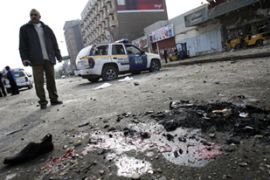Motorbike bomb hits central Baghdad
Deadly blasts occur as a UN report says 34,000 civilians died in violence last year.

Earlier, the UN human rights chief in Iraq said that 34,452 civilians had been killed and more than 36,885 wounded in 2006.
Militias blamed
Gianni Magazzeni accused the government of failing to provide security and blamed some of the violence on militias colluding with or working inside the police and army.
The figures are much higher than any statistics issued by Iraqi government officials. The government itself branded the UN’s last two-monthly report in November grossly exaggerated and banned Iraqi officials from releasing data.
No comparable data for 2005 were immediately available, but Iraqi and UN officials, along with evidence collected by reporters, indicate that sectarian bloodshed has risen dramatically in the past year, especially in Baghdad.
Increase security
Magazzeni said: “During 2006, 34,452 civilians have been violently killed. The focus of this report is actually on the need for the government to increase its action with respect to the rule of law.
|
“Without significant progress in the rule of law sectarian violence will continue indefinitely and eventually spiral out of control” Gianni Magazzeni, UN human rights chief in Iraq |
“Law enforcement agencies do not provide effective protection to the population of Iraq.“
He said “militias act in collusion with or have infiltrated” the security forces”.
Earlier estimates had put the number killed at more than 12,000.
When asked about the discrepancy, Magazzeni said the UN figures were compiled from information obtained through the Iraqi health ministry, the Baghdad mortuary, operations centres at hospitals across the country and other agencies.
“Without significant progress in the rule of law, sectarian violence will continue indefinitely and eventually spiral out of control,” he said.
The UN report says 6,376 civilians were killed in November and December.
Rate of killings
That was a rate of 105 killed across Iraq every day, compared to 120 a day in September and October when 7,054 civilians were killed in a comparable 61-day period.
Of the 4,731 people killed in Baghdad in November and December, most died of bullet wounds, the UN said – a factor that would indicate they were victims of death squad killings rather than the car bombings that are also a feature of the Iraqi capital.
An official at the Baghdad mortuary, breaking the government ban on giving out statistics, told Reuters this week that the mortuary took in about 16,000 bodies last year, 80-85 per cent of them victims of violence.
Statistics
Interior ministry officials said this month that more than 12,000 civilians were killed in “terrorist” acts. They did not give statistics for other types of violent death.
The Washington Post quoted a health ministry official last week as saying that more than 23,000 civilians and police were killed in 2006.
Removing the police element of that figure and adding the violent deaths recorded by the Baghdad mortuary would result in a number similar to that given by the UN.